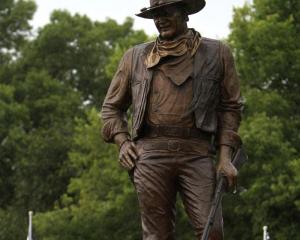Joe O'Brien (87), now of Mosgiel, had been aboard the 16,432-ton Cunard liner sent to rescue British soldiers from the French coastal town of St Nazaire, two weeks after the evacuation at Dunkirk, during World War 2.
As many as 9000 people were estimated to have been aboard Lancastria when it was hit by three bombs.
At least 1738 people died, the single biggest loss of life in Britain's maritime history.
Mr O'Brien was one of the 2477 survivors and recounted this week how he and friend George Hunt were five decks down in an overcrowded dining room when the bombs struck.
"George and I were standing together and I said to George: `Bugger this. I'm getting out of here. I'm going to get up to the top to have a look'."
Knowing the layout of the now darkened, burning, listing, overcrowded ship, the two young men were able to find their way to the promenade deck.
Mr O'Brien then lost contact with Mr Hunt and never saw him again.
Wearing a cork and canvas life jacket, Mr O'Brien climbed over the rail and stood, looking down at the sea from a height he compared with the Empire State Building.
"I was terrified," he said but then Glasgow steward Johnny Rock gave him a push.
Mr O'Brien recounted for author Jonathan Fenby - who wrote The Sinking of the Lancastria - how, from the sea, the upturned ship looked like a giant whale and he saw men standing on the hull, reluctant to jump.
" ... The men kept on singing Roll Out the Barrel ... then the sound of There'll Always Be an England came across the water."
Mr O'Brien spent four hours in the sea before being picked up by British destroyer HMS Highlander.
The fate of Lancastria was kept from the British public by then-prime minister Winston Churchill who, it is said, was concerned about its effect on morale.
The story emerged weeks later but the families of victims have always considered too little recognition was given by the British government.
Mr O'Brien received a medal in the mail last year from the Scottish Parliament in recognition of the endurance of the survivors and the ultimate sacrifice of the victims.
Ceremonies to mark the 70th anniversary of the sinking are being held in Edinburgh and St Nazaire.
In 1945, Mr O'Brien was aboard Rimutaka in Wellington delivering home New Zealand prisoners of war from Singapore when Japan surrendered.
He joined the celebrations ashore and decided to stay.
In Wellington, he met Elaine Mitchell, who grew up in the Andersons Bay orphanage, and the pair later married.
They eventually moved to Wakari, in Dunedin.
The couple had four children.
Mr O'Brien spent many years working on hydro-electric construction projects.
He said he had been "the happiest fellow in the world" living in New Zealand.


